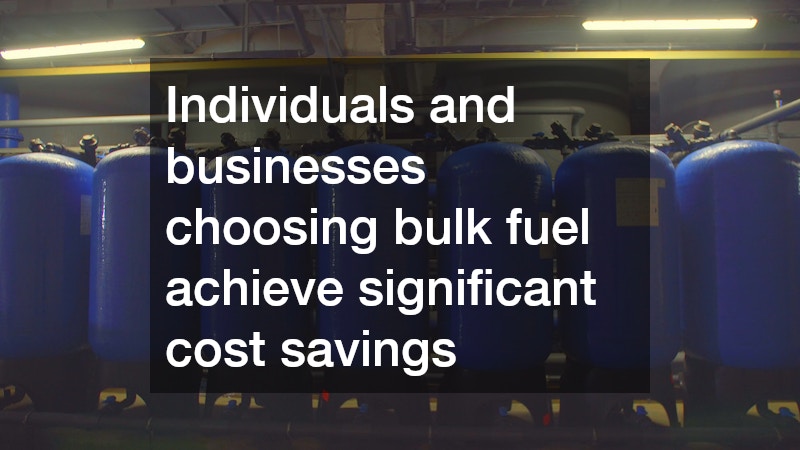

Bulk fuel services refer to the procurement and delivery of large quantities of fuel directly to businesses or individuals, typically at their premises. As industries and personal users seek cost-effective fuel solutions, bulk fuel services are increasingly becoming a popular option. This comprehensive guide will delve into the advantages, efficiency improvements, and environmental benefits of adopting bulk fuel services.
What are the Cost Benefits of Using Bulk Fuel Services?
Purchasing fuel in bulk allows businesses to benefit from lower prices per unit of fuel, leading to significant cost reductions. Traditional fueling often involves frequent trips to the pump, where prices can fluctuate, resulting in higher expenses over time. By locking in a price for bulk quantities, companies can better manage their budgets and reduce their overall fuel spend.
The savings garnered from bulk fuel services can be substantial, especially for companies with large vehicle fleets. Over time, these savings can equate to thousands of dollars that can be reallocated to other operational areas. Furthermore, bulk purchasing eliminates the need for multiple individual transactions, simplifying financial operations.
Regular purchasing not only incurs fluctuating prices but also unnecessary transaction fees. With bulk fuel services, the reduced frequency of purchasing activities can lower administrative costs as well. The streamlined approach of bulk buying makes it a financially prudent choice for organizations of all sizes.
Locking in fuel prices through bulk purchasing allows businesses to plan their finances with greater accuracy. Price stability means budgets are more predictable, mitigating the risk of unexpected fuel price increases. This predictability ensures that companies can forecast expenses more reliably, aiding in long-term financial strategies.
For businesses working on long-term projects or contracts, knowing fixed fuel costs can prevent budget overruns. This assurance is crucial for industries where fuel is a primary operating expense. Consequently, firms can allocate resources more efficiently and focus on growth and development rather than uncertain future expenses.
The availability of tax incentives may vary, but they typically reward bulk fuel users for their efficient fuel management practices. Furthermore, engaging in bulk transactions necessitates thorough documentation and tracking, which naturally aligns with tax documentation processes. This synergy between operational efficiency and fiscal benefits makes bulk fuel services appealing to tax-savvy businesses.
How Do Bulk Fuel Services Improve Efficiency?
Bulk fuel services offer a streamlined refueling process by delivering fuel directly to the business’s location, reducing dependency on external fueling stations. This ensures that fleets can be refueled on-site, limiting the time vehicles spend off the road. With less downtime required for refueling, fleet operations can proceed more smoothly and maintain high levels of productivity.
By implementing regular scheduled deliveries, businesses can optimize their refueling schedules and minimize disruptions. This is especially advantageous for industries requiring tight deadlines and maximum fleet availability. As a result, better scheduling and increased on-site refueling translate to more efficient overall operations.
Utilizing sophisticated inventory tracking systems provided by fuel service companies, businesses can better monitor their fuel levels in real time. These systems help anticipate demand and schedule deliveries accordingly, optimizing fuel storage requirements. Precise inventory management reduces the risk of downtime due to fuel shortages, thereby improving overall operational efficiency.
The improved inventory oversight afforded by bulk fuel services means that businesses can undertake proactive planning and forecasting. As demand patterns are tracked meticulously, fuel orders can be finetuned to meet operational needs precisely. This alignment between supply and demand minimizes waste and enhances the company’s operational footprint.
Overall, the time savings achieved from bulk fuel services translate directly to increased productivity and output. The ability to adhere to strict project deadlines and maintain high operation standards is a prominent advantage. As such, this time efficiency becomes a vital resource that can give companies a competitive edge in their industry.
Are There Environmental and Safety Benefits?
Bulk fuel services can reduce the environmental footprint by consolidating multiple trips to fueling stations into single bulk deliveries. This reduction in vehicle use leads directly to fewer emissions from transport, benefiting both the environment and sustainability goals. Moreover, bulk fuel storage systems are often designed to minimize evaporation losses, contributing to eco-friendly fuel handling.
Additionally, centralized refueling helps in better monitoring and controlling fuel consumption, potentially leading to more fuel-efficient practices. Many companies opting for these services are also more likely to engage in environmental audits and adopt green technologies. This proactive approach further amplifies environmental benefits and aligns with global efforts to mitigate climate change.
Safety standards in bulk fuel deliveries are stringently regulated, ensuring that fuel is handled under safe conditions, which enhances workplace safety. Service providers must adhere to national and international guidelines designed to mitigate risks associated with fuel delivery and storage. As such, businesses benefit from professionally handled services that minimize hazards connected to fueling operations.
Preventing spills is crucial for environmental protection, as it reduces contamination risks to soil and waterways. Bulk fuel services encompass proactive measures and systems that contain and control potential spills effectively. These preventive strategies not only protect the environment but also save companies from costly clean-up operations and penalties.
Individuals and businesses choosing bulk fuel not only achieve significant cost savings and enhanced financial predictability but also benefit from increased operational efficiency and robust safety standards. Furthermore, the environmental benefits and spill prevention measures underscore the responsible consumption model that bulk fuel services represent. Overall, adopting bulk fuel solutions can transform the way fuel is managed and utilized, making it a compelling choice for forward-thinking businesses and individuals.
.







